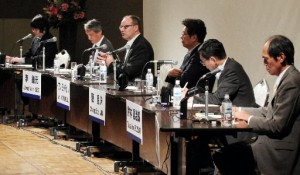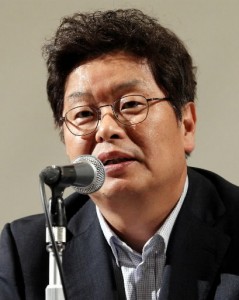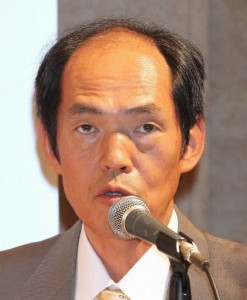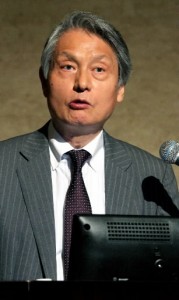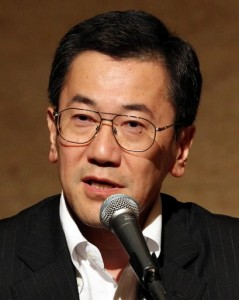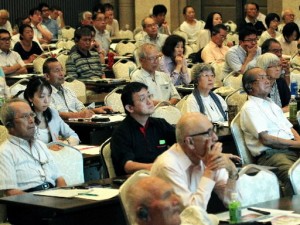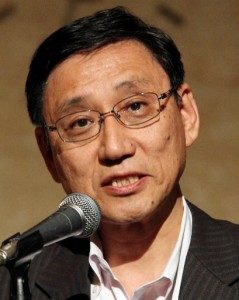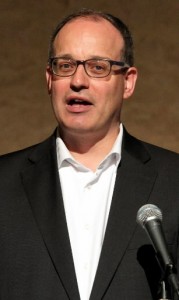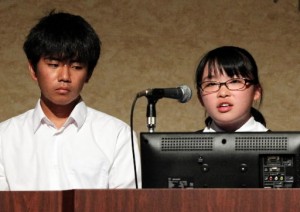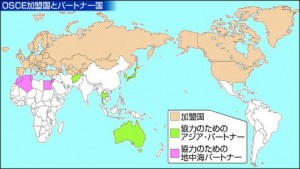Non-nuclear East Asia A future created by citizens Report on International Symposium: “From Confidence-building to Nuclear Abolition: Toward the 2015 NPT Review Conference”
Aug. 14, 2014
An international symposium titled “From Confidence-building to Nuclear Abolition: Toward the 2015 NPT Review Conference” was held on August 2 at the International Conference Center Hiroshima in Naka Ward. Tensions between nations are growing in East Asia, including Japan, as the result of problems over the understanding of history and territorial issues. Against this background, participants in the symposium debated ways to build confidence in East Asia, looking at efforts undertaken in Europe to ease military conflicts between East and West during the Cold War.
The panelists also discussed the growing international recognition of the inhumanity of nuclear weapons and how it can be put to use to bring about the abolition of nuclear weapons as well as what the citizens of Hiroshima and Nagasaki can do in light of the Japanese government’s desire to remain under the “nuclear umbrella” of the United States. Sponsored by Hiroshima City University, Nagasaki University’s Research Center for Nuclear Weapons Abolition (RECNA), and the Chugoku Shimbun, the symposium was attended by about 210 people.
Keynote Speakers
Lee Jong Won, professor, Waseda University Graduate School of Asia-Pacific Studies
Ian Mitchell, head, External Co-operation Section, Organization for Security and Co-operation in Europe
Panelists
Jin Chang-Soo, director, Japan Center of South Korea’s Sejong Institute
Tatsujiro Suzuki, vice director and professor, Nagasaki University Research Center for Nuclear Weapons Abolition
Kazumi Mizumoto, vice president and professor, Hiroshima Peace Institute of Hiroshima City University
Presenters of Reports
Shingo Yamagami, deputy director-general, Foreign Policy Bureau, Ministry of Foreign Affairs
Yumi Kanazaki, staff writer, Chugoku Shimbun’s Hiroshima Peace Media Center Chugoku Shimbun junior writers:
Shino Taniguchi, first-year high school student
Aoi Nakagawa, second-year junior high school student
Moderator
Akihiro Kawakami, assistant professor, Hiroshima Peace Institute, Hiroshima City University
How can confidence be built in East Asia, and can that be tied to the abolition of nuclear weapons?
Lee: There’s a problem of the understanding of history between Japan and South Korea. It’s a fact that there are gaps on various levels in terms of how to look at history. As the societies move closer together and there is more interaction between people, how to look at history will inevitably be a problem.
But even if there is a gap, it’s important to find more common ground with regard to common challenges in the region. This doesn’t mean just working toward resolution. There must also be a process for reducing antagonism and closing the gap in a future-oriented manner.
Jin: I don’t think the gap in the understanding of history between the two countries can be bridged. First of all, you have to understand the other side. Over the long term, the gap will narrow somewhat.
But more than that, the problem in East Asia is how to deal with North Korea and China. The national strategies of Japan and South Korea are gradually growing apart. We have to bridge the gap in the perception of international order. There must be discussions not just between countries but including the private sector as well.
Suzuki: I believe pursuing negotiations on the concept of a nuclear weapon-free zone in Northeast Asia will promote confidence-building. Working on confidence-building in parallel with this concept will have a synergistic effect.
Dialogue on the current concept is still at the academic stage. As Mr. Jin said, it’s important to make it possible for people from the private sector as well as governments to participate.
Mitchell: I’d like to consider what can be done in East Asia by using an international framework. The United Nations has stated that it can’t resolve every issue because even if it’s a global problem, there must be a functioning security framework in the region.
A person-to-person approach is necessary for conflict resolution. The inability to do that is one phenomenon found in conflict. An organization like the Organization for Security and Co-operation in Europe (OSCE) can contribute at times like that.
In my personal view, over the past 20 years the OSCE has encouraged the disclosure of information on which countries have which weapons in what amounts. Through this process, confidence has been built. I think this same approach can be used with nuclear weapons.
There is growing momentum among citizens for the establishment of a nuclear weapons convention that focuses on the inhumanity of nuclear weapons. How can this be achieved?
Mizumoto: A citizens’ movement was behind the establishment of the treaty banning anti-personnel land mines and cluster bombs. The fact that non-governmental organizations got nations to take action can serve as a guide for a movement toward a nuclear weapons convention. I think it’s worth a try.
But in the case of nuclear weapons, very extensive, difficult debate is necessary. In addition to the nuclear nations, there will probably be opposition from Japan, which is under the nuclear umbrella, and the munitions industry. If the nuclear-weapon states don’t join the debate, it will be meaningless. There’s also the problem of whether or not to refer to “outlawing” nuclear weapons.
Jin Chang-Soo
Born in Busan, South Korea in 1961. Earned a doctorate in political science from the University of Tokyo in 1994. Served as a member of the Presidential Advisory Council for Foreign Affairs and in other posts during the administration of Roh Moo-hyun from 2004 to 2007. Specializes in Japan’s political and economic diplomacy.
Kazumi Mizumoto
Born in Hiroshima in 1957. Earned a bachelor’s degree in law at the University of Tokyo in 1981 and a master’s degree from the Fletcher School, a graduate school of international affairs at Tufts University in the U.S., in 1989. Served as head of the Los Angeles bureau of the Asahi Shimbun and as an assistant professor at the Hiroshima Peace Institute prior to assuming his current post 10 years ago.
There is discussion of similarities between the political situation in East Asia today and the situation in Europe 100 years ago. Will East Asia follow the same path that “old Europe” took from the 19th Century through the first half of the 20th Century? Or will East Asia join in an effort like that undertaken by the “new Europe” from the second half of the 20th Century through the present? East Asia is approaching a major turning point in its history.
As nations, Japan, China and South Korea have things in common. From an economic standpoint, they have had to open their borders wider, and the gap resulting from neo-liberal policy is widening as well. Under these circumstances, these nations are emphasizing a “nationalistic identity” as a new way of unifying the people. History education has been reinforced in Japan, China and South Korea, citing the need to foster patriotism through education.
Since the war, as part of their national agendas, Japan, China and South Korea have set aside various points of dispute and placed priority on maintaining the status quo. The territorial issues between Japan and South Korea and between Japan and China were put on the back burner. Efforts were also made to resolve issues related to history politically, and concrete “settlement of the past” was set aside. This strategy of maintaining the status quo is now on shaky ground.
So, what should be done? Going beyond the formation of sovereign states or nation states and moving toward forming a region is an effective method. There are many problems in East Asia, but in terms of the economy a single region is already being formed.
The challenge is how to go about creating a region politically, diplomatically and in terms of security. In that respect we can learn from the regional unification process used to form the European Community and the efforts at exchange, co-existence and cooperation between Eastern and Western Europe that were made in order to overcome conflicts during the Cold War. We must seriously consider linking the six-party talks on the problem of North Korea’s nuclear development, the trilateral cooperation between Japan, China and South Korea, and the East Asia Summit.
Lee Jong Won
Born in South Korea in 1953. After dropping out of Seoul National University, graduated from International Christian University in Japan. Earned a doctorate in international politics from the University of Tokyo. Assumed his current post in April 2012. Specializes in international relations in East Asia and contemporary Korean studies.
The deterioration in relations between Japan and South Korea is also affecting the present order in Northeast Asia. The United States, which wants to keep the rise of China in check, regards this situation as a hindrance to its Asia policy. Meanwhile China has approved the establishment of a museum in Harbin honoring An Jeung-gun [a Korean independence activist who assassinated former Prime Minister Hirobumi Ito, first Resident-General of Korea]. This has further widened the gulf between Japan and South Korea and is destabilizing the partnership between Japan, the U.S. and South Korea. The situation in Northeast Asia is becoming more complicated as a result of the differing agendas of the nations in the region.
Japan has initiated its own diplomacy, reaching agreement with North Korea to reopen the investigation into North Korea’s abduction of Japanese citizens and lifting some economic sanctions. But there have not even been discussions between Japan and South Korea on how to handle an emergency on the Korean Peninsula.
The reason there is no dialogue between Japan and South Korea is that trust, the most important element in diplomacy, is lacking between the two nations. While saying it would continue support for the Kono Statement [on the involvement of the Japanese Imperial Army in the coercion of so-called “comfort women” to work in military-run brothels during World War II], the Abe administration decided to review the statement’s content. South Korea would like to see more transparency in Japan’s debate on the exercise of the right of collective defense. This sort of distrust is affecting foreign relations.
I would like to suggest three ways to improve relations. There must be frank exchanges of opinion on issues related to the perception of history, including the “comfort women.” There must be a return to strategic diplomacy based on an international perspective that is free of domestic politics such as the rise of nationalism. And there must be serious debate on security in Northeast Asia apart from historical issues. Japan and South Korea have built relations between their two nations while compromising. I would like to start by reaffirming the importance of improving relations.
The security environment around Japan is becoming increasingly serious. Behind this are rising power and a geopolitical clash in which the continued existence of a nationalistic regime is at stake. So how should trust be built?
First of all, it is essential that conflicts over territorial issues and issues over exclusive economic zones be resolved peacefully in accordance with international law. Japan has sought peaceful resolutions, including by considering referring the conflicts over the northern territories and Takeshima [Dokdo] to the International Court of Justice.
The countries in Asia have various political and economic systems as well as various views on security. Multilateral frameworks such as the Association of Southeast Asian Nations (ASEAN), the East Asia Summit and the Non-Proliferation and Disarmament Initiative, must be strengthened.
Dialogue and exchanges must be promoted at every level, not just between political leaders but including private citizens. With the view that dialogue is essential to building trust, Japan has taken every opportunity to let its neighbors know that the door to dialogue is always open, but unfortunately some countries have not responded.
The Foreign Ministry recently interviewed several thousand people in major ASEAN member countries as part of a survey it conducted. When asked which country they felt was most trustworthy, with the exception of the Philippines, respondents in every country answered Japan. I believe this is a positive result of Japan’s postwar peace diplomacy.
Shingo Yamagami
Born in Tokyo in 1961. Earned a bachelor’s degree in law at the University of Tokyo. Joined the Foreign Ministry in 1984. Studied at Columbia University’s School of International and Public Affairs. Served as director of the Second North America Division of the North American Affairs Bureau and as deputy director-general of the International Legal Affairs Bureau prior to assuming his current post in July.
Please tell me your thoughts on the role that citizens should play in the abolition of nuclear weapons and in confidence-building.
Jin: Both South Korea and Japan have to avoid misunderstandings at the private citizen level and accept each other. Keeping promises is also important in order to restore trust. It’s important to recognize what both countries have built since the 1965 signing of the Treaty on Basic Relations between Japan and the Republic of Korea and for both countries to move into the future together.
Mizumoto: People should do what they can do in good conscience as one individual. People need to consider the background behind why things are the way they are, put themselves in the other person’s place and then convey their ideas with humility.
Mitchell: When setting up a security community like the OSCE in Asia, the role of civil society is extremely important. The OSCE has invited the public to participate. It’s important for private citizens to talk directly with diplomats and representatives of the state. I’d like you to keep that in mind.
Suzuki: I was very impressed by the presentation by the junior writers earlier. I think the role of young people is very important in both Hiroshima and Nagasaki. I’d like young people to join with us in conveying our desire for the abolition of nuclear weapons.
At the same time, experts, especially scientists, have an important responsibility. I’m affiliated with the Pugwash Conferences, an international organization of scientists working to abolish nuclear weapons. Next year an international conference will be held in Nagasaki. At that time I will call on scientists to take action.
Lee: The shock I got when I first visited the Peace Memorial Museum 30 years ago was one of the things that motivated me. I’d like to see a citizens’ movement to get the president of the United States to come here. Putting that message out is important.
Tatsujiro Suzuki
Born in Osaka in 1951. Earned a bachelor’s degree in nuclear engineering at the University of Tokyo. Holds a doctorate in engineering. Has served as a senior research scientist at the Central Research Institute of the Electric Power Industry and as vice-chairman of the Japan Atomic Energy Commission at the Cabinet Office. Assumed his current post in April. Also serves as a member of the council of the Pugwash Conferences on Science and World Affairs.
I hope that you may find inspiration in the OSCE’s experiences in building co-operative security.
In 1975 the parties to the Conference on Security and Co-operation in Europe – the CSCE – came together to agree on a basis for interstate relations. The result was the Helsinki Decalogue, ten principles that remain a foundation for the OSCE today. The signing of the Helsinki Final Act was all the more striking because the two main blocs of the Cold War era had distinct, even mutually opposing, political goals. Nonetheless, they were able to find common ground.
What made this co-operation possible? Certainly, the most important factor is context: one needs an environment that is ripe for such an agreement. Let us recall that at that moment in world history the Cold War, with its logic of mutual assured destruction, was at its height. Yet both sides were looking for a way of reducing risk, a way out. This was a moment of détente where there was a willingness to engage, and to compromise – particularly on the part of the leadership in Washington and Moscow at the time.
A central legacy of Helsinki is the OSCE’s comprehensive approach to security, which encompasses three dimensions: politico-military, economic and environmental, and the human dimension.
The OSCE, with 57 participating States, is the world’s largest and most inclusive regional organization under Chapter VIII of the United Nations Charter. The key point is that the OSCE format keeps dialogue going, even in the context of conflict. Our ambassadorial-level Permanent Council and Forum for Security Cooperation both meet weekly, providing continuous engagement among the participating States.
The OSCE’s decisions are taken by consensus. Inclusivity is the OSCE’s greatest strength, but it has sometimes been perceived as a source of frustration or weakness. All actors, both small and large, have equal voices. The Organization represents States with different interests and priorities, which means that they do not always share a common agenda. However, through the exercise of political commitment, these differences can be bridged while recognizing the diversity of interests.
How is dialogue turned into concrete, results-oriented activities? The OSCE is a highly decentralized organization. Its field operations assist participating States to implement their commitments, and to engage at all stages of the conflict cycle, including early warning, conflict prevention, crisis management, post-conflict rehabilitation and, increasingly, reconciliation. Outside the Organization, but key to its success are civil society actors, including NGOs and academic experts.
The OSCE activities vis-a-vis the Ukraine crisis are a very concrete example of the wide range of actions and initiatives which the OSCE toolbox provides for, with the consensus of all 57 participating States.
The ASEAN Regional Forum offers one of the opportunities for states to discuss, for them to build confidence in each other, and ultimately for building a security relationship based on trust. I recognize the current situation is challenging, and military issues are highly sensitive. In such a situation, it is most likely that the best path to trust-building is to make progress in the field of incremental approaches, for example, not so much in the military field, but rather in economic and environmental issues, which are less sensitive.
In the OSCE we fully appreciate that our model is only that, a single model. We fully recognize and appreciate that your eventual success will come from borrowing only those elements from the OSCE toolbox that are suited to your political and security context, adapting them to your specific needs – and developing individualized tools of your own.
Ian Mitchell
Born in Toronto, Canada in 1965. Holds a doctorate in international politics from Aberystwyth University in Wales. Served in the Office of the United Nations High Commissioner for Refugees and in the Department of External Relations and Communications of the United Nations Relief and Works Agency for Palestine Refugees in the Near East prior to assuming his current post.
In order to bring about a nuclear-free world, it is essential to work to outlaw nuclear weapons. But April’s Hiroshima Statement of the Non-Proliferation and Disarmament Initiative (NPDI), of which the Japanese government is a leader, made no reference to this. I am compelled to say that the voices of the atomic bomb survivors were not heard.
At this spring’s preparatory committee meeting of the review conference for the Nuclear Non-proliferation Treaty, Mexico, which is also a member of the NPDI, called for initiating negotiations on a legal document that would ban nuclear weapons, and the Philippines called for the immediate start of negotiations on a nuclear weapons convention. Japan, on the other hand, seemed to say little of import.
The Treaty for the Prohibition of Nuclear Weapons in Latin America and the Caribbean can serve as a reference in establishing a nuclear weapon-free zone in Northeast Asia. The head of the treaty organization has stated that conditions in Central and South America were unfavorable at the time and there was little prospect of the treaty’s establishment. But by overcoming this and making the treaty a reality, confidence-building and security in Central and South America were promoted. No matter how difficult the circumstances, we must not give up.
In “Japan’s Disarmament and Non-Proliferation Policy” issued by the Foreign Ministry last year, the Japanese government referred to a nuclear-free zone in Northeast Asia for the first time. I hope to see progress on this in the future.
The future of the peaceful use of nuclear energy is also important. The nuclear fuel cycle and how to handle the plutonium stockpile are major issues.
In line with the hopes of the atomic bomb survivors, now is the time for Japan to exercise leadership and to promote a nuclear-free zone in Northeast Asia. Precisely because the political situation is difficult, we must discuss a concrete, realistic path to this goal while fostering mutual trust.
Recently there is a new push to highlight the inhumanity of nuclear weapons and stress that they must be abolished on this basis, and this movement is gaining momentum. If people knew what just one nuclear warhead could do, they could not deny the inhumanity of these weapons.
In April 2010 the director-general of the International Committee for the Red Cross said that “the ICRC finds it difficult to envisage how any use of nuclear weapons could be compatible with the rules of international humanitarian law.” This generated the momentum for this effort.
Nuclear weapons are nothing less than weapons that destroy completely the dignity of living beings. But the world is surprisingly ignorant of this. First, people must be made aware of the inhumanity of nuclear weapons. But we must not lose sight of the next goal to be pursued.
Nuclear disarmament will not be the only topic of discussion at next year’s review conference of the Nuclear Non-proliferation Treaty, but, regardless of the situation in the international community, we must continue to call for the abolition of nuclear weapons, which is the “basic philosophy” of Hiroshima and Nagasaki. The experiences of the A-bombed cities, which they must convey to the world, and the role they must play will take on more and more significance.
This is the last generation of atomic bomb survivors whose stories we will be able to hear directly. It is meaningful that the articles we write can convey the survivors’ stories to readers who don’t have an opportunity to hear them.
It may be difficult to abolish nuclear weapons. But if non-governmental organizations join together and call on the world to take action, perhaps many countries will change their way of thinking and we can move toward nuclear abolition. Learning while having a sense of the destruction nuclear weapons can bring about should lead to nations’ nuclear disarmament.
Keywords Organization for Security and Co-operation in Europe (OSCE)
The Organization for Security and Co-operation in Europe, the world’s largest regional security organization, consists of 57 states in Europe, Central Asia and North America as well as Russia and other former Soviet bloc nations. The organization addresses security in a comprehensive manner, not just its military aspects but also economic, environmental, human rights and humanitarian issues. The organization was originally formed as the Commission on Security and Cooperation in Europe in 1972 at the suggestion of the Soviet Union and included 35 European nations. Under the 1975 Helsinki Accords, participating states agreed on various principles, including the inviolability of frontiers, and during the Cold War the organization functioned as a buffer between East and West. With the dramatic changes in the political situation in Europe, including the collapse of the Soviet Union, the democratization of the nations of Eastern Europe and the unification of Germany, the organization changed its name to the Organization for Security and Co-operation in Europe in 1995. The organization’s secretariat is headquartered in Vienna, and the Permanent Council (ambassador level) meets weekly. The Chairman-in-Office post is held by Switzerland this year. Japan is an observer.
This feature article was prepared by Keisuke Yoshihara, Rie Nii, Yumi Kanazaki, Junji Akechi and Yuji Yamamoto. The photos were taken by Hirofumi Fukui.
(Originally published on August 5, 2014)
The panelists also discussed the growing international recognition of the inhumanity of nuclear weapons and how it can be put to use to bring about the abolition of nuclear weapons as well as what the citizens of Hiroshima and Nagasaki can do in light of the Japanese government’s desire to remain under the “nuclear umbrella” of the United States. Sponsored by Hiroshima City University, Nagasaki University’s Research Center for Nuclear Weapons Abolition (RECNA), and the Chugoku Shimbun, the symposium was attended by about 210 people.
Keynote Speakers
Lee Jong Won, professor, Waseda University Graduate School of Asia-Pacific Studies
Ian Mitchell, head, External Co-operation Section, Organization for Security and Co-operation in Europe
Panelists
Jin Chang-Soo, director, Japan Center of South Korea’s Sejong Institute
Tatsujiro Suzuki, vice director and professor, Nagasaki University Research Center for Nuclear Weapons Abolition
Kazumi Mizumoto, vice president and professor, Hiroshima Peace Institute of Hiroshima City University
Presenters of Reports
Shingo Yamagami, deputy director-general, Foreign Policy Bureau, Ministry of Foreign Affairs
Yumi Kanazaki, staff writer, Chugoku Shimbun’s Hiroshima Peace Media Center Chugoku Shimbun junior writers:
Shino Taniguchi, first-year high school student
Aoi Nakagawa, second-year junior high school student
Moderator
Akihiro Kawakami, assistant professor, Hiroshima Peace Institute, Hiroshima City University
■Panel Discussion The Path to Confidence-building
Jin: Start with mutual understanding to narrow gap
Mizumoto: Extensive debate on nuclear weapons convention needed
How can confidence be built in East Asia, and can that be tied to the abolition of nuclear weapons?
Lee: There’s a problem of the understanding of history between Japan and South Korea. It’s a fact that there are gaps on various levels in terms of how to look at history. As the societies move closer together and there is more interaction between people, how to look at history will inevitably be a problem.
But even if there is a gap, it’s important to find more common ground with regard to common challenges in the region. This doesn’t mean just working toward resolution. There must also be a process for reducing antagonism and closing the gap in a future-oriented manner.
Jin: I don’t think the gap in the understanding of history between the two countries can be bridged. First of all, you have to understand the other side. Over the long term, the gap will narrow somewhat.
But more than that, the problem in East Asia is how to deal with North Korea and China. The national strategies of Japan and South Korea are gradually growing apart. We have to bridge the gap in the perception of international order. There must be discussions not just between countries but including the private sector as well.
Suzuki: I believe pursuing negotiations on the concept of a nuclear weapon-free zone in Northeast Asia will promote confidence-building. Working on confidence-building in parallel with this concept will have a synergistic effect.
Dialogue on the current concept is still at the academic stage. As Mr. Jin said, it’s important to make it possible for people from the private sector as well as governments to participate.
Mitchell: I’d like to consider what can be done in East Asia by using an international framework. The United Nations has stated that it can’t resolve every issue because even if it’s a global problem, there must be a functioning security framework in the region.
A person-to-person approach is necessary for conflict resolution. The inability to do that is one phenomenon found in conflict. An organization like the Organization for Security and Co-operation in Europe (OSCE) can contribute at times like that.
In my personal view, over the past 20 years the OSCE has encouraged the disclosure of information on which countries have which weapons in what amounts. Through this process, confidence has been built. I think this same approach can be used with nuclear weapons.
There is growing momentum among citizens for the establishment of a nuclear weapons convention that focuses on the inhumanity of nuclear weapons. How can this be achieved?
Mizumoto: A citizens’ movement was behind the establishment of the treaty banning anti-personnel land mines and cluster bombs. The fact that non-governmental organizations got nations to take action can serve as a guide for a movement toward a nuclear weapons convention. I think it’s worth a try.
But in the case of nuclear weapons, very extensive, difficult debate is necessary. In addition to the nuclear nations, there will probably be opposition from Japan, which is under the nuclear umbrella, and the munitions industry. If the nuclear-weapon states don’t join the debate, it will be meaningless. There’s also the problem of whether or not to refer to “outlawing” nuclear weapons.
Jin Chang-Soo
Born in Busan, South Korea in 1961. Earned a doctorate in political science from the University of Tokyo in 1994. Served as a member of the Presidential Advisory Council for Foreign Affairs and in other posts during the administration of Roh Moo-hyun from 2004 to 2007. Specializes in Japan’s political and economic diplomacy.
Kazumi Mizumoto
Born in Hiroshima in 1957. Earned a bachelor’s degree in law at the University of Tokyo in 1981 and a master’s degree from the Fletcher School, a graduate school of international affairs at Tufts University in the U.S., in 1989. Served as head of the Los Angeles bureau of the Asahi Shimbun and as an assistant professor at the Hiroshima Peace Institute prior to assuming his current post 10 years ago.
■Keynote Speech Lee Wong Jon
Regional formation transcending borders
There is discussion of similarities between the political situation in East Asia today and the situation in Europe 100 years ago. Will East Asia follow the same path that “old Europe” took from the 19th Century through the first half of the 20th Century? Or will East Asia join in an effort like that undertaken by the “new Europe” from the second half of the 20th Century through the present? East Asia is approaching a major turning point in its history.
As nations, Japan, China and South Korea have things in common. From an economic standpoint, they have had to open their borders wider, and the gap resulting from neo-liberal policy is widening as well. Under these circumstances, these nations are emphasizing a “nationalistic identity” as a new way of unifying the people. History education has been reinforced in Japan, China and South Korea, citing the need to foster patriotism through education.
Since the war, as part of their national agendas, Japan, China and South Korea have set aside various points of dispute and placed priority on maintaining the status quo. The territorial issues between Japan and South Korea and between Japan and China were put on the back burner. Efforts were also made to resolve issues related to history politically, and concrete “settlement of the past” was set aside. This strategy of maintaining the status quo is now on shaky ground.
So, what should be done? Going beyond the formation of sovereign states or nation states and moving toward forming a region is an effective method. There are many problems in East Asia, but in terms of the economy a single region is already being formed.
The challenge is how to go about creating a region politically, diplomatically and in terms of security. In that respect we can learn from the regional unification process used to form the European Community and the efforts at exchange, co-existence and cooperation between Eastern and Western Europe that were made in order to overcome conflicts during the Cold War. We must seriously consider linking the six-party talks on the problem of North Korea’s nuclear development, the trilateral cooperation between Japan, China and South Korea, and the East Asia Summit.
Lee Jong Won
Born in South Korea in 1953. After dropping out of Seoul National University, graduated from International Christian University in Japan. Earned a doctorate in international politics from the University of Tokyo. Assumed his current post in April 2012. Specializes in international relations in East Asia and contemporary Korean studies.
■Reports: Looking at diplomatic issues
Jin: Discussions on perceptions of history needed
The deterioration in relations between Japan and South Korea is also affecting the present order in Northeast Asia. The United States, which wants to keep the rise of China in check, regards this situation as a hindrance to its Asia policy. Meanwhile China has approved the establishment of a museum in Harbin honoring An Jeung-gun [a Korean independence activist who assassinated former Prime Minister Hirobumi Ito, first Resident-General of Korea]. This has further widened the gulf between Japan and South Korea and is destabilizing the partnership between Japan, the U.S. and South Korea. The situation in Northeast Asia is becoming more complicated as a result of the differing agendas of the nations in the region.
Japan has initiated its own diplomacy, reaching agreement with North Korea to reopen the investigation into North Korea’s abduction of Japanese citizens and lifting some economic sanctions. But there have not even been discussions between Japan and South Korea on how to handle an emergency on the Korean Peninsula.
The reason there is no dialogue between Japan and South Korea is that trust, the most important element in diplomacy, is lacking between the two nations. While saying it would continue support for the Kono Statement [on the involvement of the Japanese Imperial Army in the coercion of so-called “comfort women” to work in military-run brothels during World War II], the Abe administration decided to review the statement’s content. South Korea would like to see more transparency in Japan’s debate on the exercise of the right of collective defense. This sort of distrust is affecting foreign relations.
I would like to suggest three ways to improve relations. There must be frank exchanges of opinion on issues related to the perception of history, including the “comfort women.” There must be a return to strategic diplomacy based on an international perspective that is free of domestic politics such as the rise of nationalism. And there must be serious debate on security in Northeast Asia apart from historical issues. Japan and South Korea have built relations between their two nations while compromising. I would like to start by reaffirming the importance of improving relations.
Yamagami: Strengthen cooperation between nations
The security environment around Japan is becoming increasingly serious. Behind this are rising power and a geopolitical clash in which the continued existence of a nationalistic regime is at stake. So how should trust be built?
First of all, it is essential that conflicts over territorial issues and issues over exclusive economic zones be resolved peacefully in accordance with international law. Japan has sought peaceful resolutions, including by considering referring the conflicts over the northern territories and Takeshima [Dokdo] to the International Court of Justice.
The countries in Asia have various political and economic systems as well as various views on security. Multilateral frameworks such as the Association of Southeast Asian Nations (ASEAN), the East Asia Summit and the Non-Proliferation and Disarmament Initiative, must be strengthened.
Dialogue and exchanges must be promoted at every level, not just between political leaders but including private citizens. With the view that dialogue is essential to building trust, Japan has taken every opportunity to let its neighbors know that the door to dialogue is always open, but unfortunately some countries have not responded.
The Foreign Ministry recently interviewed several thousand people in major ASEAN member countries as part of a survey it conducted. When asked which country they felt was most trustworthy, with the exception of the Philippines, respondents in every country answered Japan. I believe this is a positive result of Japan’s postwar peace diplomacy.
Shingo Yamagami
Born in Tokyo in 1961. Earned a bachelor’s degree in law at the University of Tokyo. Joined the Foreign Ministry in 1984. Studied at Columbia University’s School of International and Public Affairs. Served as director of the Second North America Division of the North American Affairs Bureau and as deputy director-general of the International Legal Affairs Bureau prior to assuming his current post in July.
■Panel Discussion The Role of Citizens
Suzuki: Scientists should take action
Lee: Invite U.S. president to Hiroshima
Mitchell: Dialogue on security community important
Please tell me your thoughts on the role that citizens should play in the abolition of nuclear weapons and in confidence-building.
Jin: Both South Korea and Japan have to avoid misunderstandings at the private citizen level and accept each other. Keeping promises is also important in order to restore trust. It’s important to recognize what both countries have built since the 1965 signing of the Treaty on Basic Relations between Japan and the Republic of Korea and for both countries to move into the future together.
Mizumoto: People should do what they can do in good conscience as one individual. People need to consider the background behind why things are the way they are, put themselves in the other person’s place and then convey their ideas with humility.
Mitchell: When setting up a security community like the OSCE in Asia, the role of civil society is extremely important. The OSCE has invited the public to participate. It’s important for private citizens to talk directly with diplomats and representatives of the state. I’d like you to keep that in mind.
Suzuki: I was very impressed by the presentation by the junior writers earlier. I think the role of young people is very important in both Hiroshima and Nagasaki. I’d like young people to join with us in conveying our desire for the abolition of nuclear weapons.
At the same time, experts, especially scientists, have an important responsibility. I’m affiliated with the Pugwash Conferences, an international organization of scientists working to abolish nuclear weapons. Next year an international conference will be held in Nagasaki. At that time I will call on scientists to take action.
Lee: The shock I got when I first visited the Peace Memorial Museum 30 years ago was one of the things that motivated me. I’d like to see a citizens’ movement to get the president of the United States to come here. Putting that message out is important.
Tatsujiro Suzuki
Born in Osaka in 1951. Earned a bachelor’s degree in nuclear engineering at the University of Tokyo. Holds a doctorate in engineering. Has served as a senior research scientist at the Central Research Institute of the Electric Power Industry and as vice-chairman of the Japan Atomic Energy Commission at the Cabinet Office. Assumed his current post in April. Also serves as a member of the council of the Pugwash Conferences on Science and World Affairs.
■Keynote Speech Ian Mitchell
Seeking cooperation Europe offers good example
I hope that you may find inspiration in the OSCE’s experiences in building co-operative security.
In 1975 the parties to the Conference on Security and Co-operation in Europe – the CSCE – came together to agree on a basis for interstate relations. The result was the Helsinki Decalogue, ten principles that remain a foundation for the OSCE today. The signing of the Helsinki Final Act was all the more striking because the two main blocs of the Cold War era had distinct, even mutually opposing, political goals. Nonetheless, they were able to find common ground.
What made this co-operation possible? Certainly, the most important factor is context: one needs an environment that is ripe for such an agreement. Let us recall that at that moment in world history the Cold War, with its logic of mutual assured destruction, was at its height. Yet both sides were looking for a way of reducing risk, a way out. This was a moment of détente where there was a willingness to engage, and to compromise – particularly on the part of the leadership in Washington and Moscow at the time.
A central legacy of Helsinki is the OSCE’s comprehensive approach to security, which encompasses three dimensions: politico-military, economic and environmental, and the human dimension.
The OSCE, with 57 participating States, is the world’s largest and most inclusive regional organization under Chapter VIII of the United Nations Charter. The key point is that the OSCE format keeps dialogue going, even in the context of conflict. Our ambassadorial-level Permanent Council and Forum for Security Cooperation both meet weekly, providing continuous engagement among the participating States.
The OSCE’s decisions are taken by consensus. Inclusivity is the OSCE’s greatest strength, but it has sometimes been perceived as a source of frustration or weakness. All actors, both small and large, have equal voices. The Organization represents States with different interests and priorities, which means that they do not always share a common agenda. However, through the exercise of political commitment, these differences can be bridged while recognizing the diversity of interests.
How is dialogue turned into concrete, results-oriented activities? The OSCE is a highly decentralized organization. Its field operations assist participating States to implement their commitments, and to engage at all stages of the conflict cycle, including early warning, conflict prevention, crisis management, post-conflict rehabilitation and, increasingly, reconciliation. Outside the Organization, but key to its success are civil society actors, including NGOs and academic experts.
The OSCE activities vis-a-vis the Ukraine crisis are a very concrete example of the wide range of actions and initiatives which the OSCE toolbox provides for, with the consensus of all 57 participating States.
The ASEAN Regional Forum offers one of the opportunities for states to discuss, for them to build confidence in each other, and ultimately for building a security relationship based on trust. I recognize the current situation is challenging, and military issues are highly sensitive. In such a situation, it is most likely that the best path to trust-building is to make progress in the field of incremental approaches, for example, not so much in the military field, but rather in economic and environmental issues, which are less sensitive.
In the OSCE we fully appreciate that our model is only that, a single model. We fully recognize and appreciate that your eventual success will come from borrowing only those elements from the OSCE toolbox that are suited to your political and security context, adapting them to your specific needs – and developing individualized tools of your own.
Ian Mitchell
Born in Toronto, Canada in 1965. Holds a doctorate in international politics from Aberystwyth University in Wales. Served in the Office of the United Nations High Commissioner for Refugees and in the Department of External Relations and Communications of the United Nations Relief and Works Agency for Palestine Refugees in the Near East prior to assuming his current post.
■Reports: From Hiroshima and Nagasaki
Suzuki: Leadership is Japan’s role
In order to bring about a nuclear-free world, it is essential to work to outlaw nuclear weapons. But April’s Hiroshima Statement of the Non-Proliferation and Disarmament Initiative (NPDI), of which the Japanese government is a leader, made no reference to this. I am compelled to say that the voices of the atomic bomb survivors were not heard.
At this spring’s preparatory committee meeting of the review conference for the Nuclear Non-proliferation Treaty, Mexico, which is also a member of the NPDI, called for initiating negotiations on a legal document that would ban nuclear weapons, and the Philippines called for the immediate start of negotiations on a nuclear weapons convention. Japan, on the other hand, seemed to say little of import.
The Treaty for the Prohibition of Nuclear Weapons in Latin America and the Caribbean can serve as a reference in establishing a nuclear weapon-free zone in Northeast Asia. The head of the treaty organization has stated that conditions in Central and South America were unfavorable at the time and there was little prospect of the treaty’s establishment. But by overcoming this and making the treaty a reality, confidence-building and security in Central and South America were promoted. No matter how difficult the circumstances, we must not give up.
In “Japan’s Disarmament and Non-Proliferation Policy” issued by the Foreign Ministry last year, the Japanese government referred to a nuclear-free zone in Northeast Asia for the first time. I hope to see progress on this in the future.
The future of the peaceful use of nuclear energy is also important. The nuclear fuel cycle and how to handle the plutonium stockpile are major issues.
In line with the hopes of the atomic bomb survivors, now is the time for Japan to exercise leadership and to promote a nuclear-free zone in Northeast Asia. Precisely because the political situation is difficult, we must discuss a concrete, realistic path to this goal while fostering mutual trust.
Kanazaki: Experiences of Hiroshima, Nagasaki will take on greater significance
Recently there is a new push to highlight the inhumanity of nuclear weapons and stress that they must be abolished on this basis, and this movement is gaining momentum. If people knew what just one nuclear warhead could do, they could not deny the inhumanity of these weapons.
In April 2010 the director-general of the International Committee for the Red Cross said that “the ICRC finds it difficult to envisage how any use of nuclear weapons could be compatible with the rules of international humanitarian law.” This generated the momentum for this effort.
Nuclear weapons are nothing less than weapons that destroy completely the dignity of living beings. But the world is surprisingly ignorant of this. First, people must be made aware of the inhumanity of nuclear weapons. But we must not lose sight of the next goal to be pursued.
Nuclear disarmament will not be the only topic of discussion at next year’s review conference of the Nuclear Non-proliferation Treaty, but, regardless of the situation in the international community, we must continue to call for the abolition of nuclear weapons, which is the “basic philosophy” of Hiroshima and Nagasaki. The experiences of the A-bombed cities, which they must convey to the world, and the role they must play will take on more and more significance.
Junior Writers: It all starts with learning
This is the last generation of atomic bomb survivors whose stories we will be able to hear directly. It is meaningful that the articles we write can convey the survivors’ stories to readers who don’t have an opportunity to hear them.
It may be difficult to abolish nuclear weapons. But if non-governmental organizations join together and call on the world to take action, perhaps many countries will change their way of thinking and we can move toward nuclear abolition. Learning while having a sense of the destruction nuclear weapons can bring about should lead to nations’ nuclear disarmament.
Keywords Organization for Security and Co-operation in Europe (OSCE)
The Organization for Security and Co-operation in Europe, the world’s largest regional security organization, consists of 57 states in Europe, Central Asia and North America as well as Russia and other former Soviet bloc nations. The organization addresses security in a comprehensive manner, not just its military aspects but also economic, environmental, human rights and humanitarian issues. The organization was originally formed as the Commission on Security and Cooperation in Europe in 1972 at the suggestion of the Soviet Union and included 35 European nations. Under the 1975 Helsinki Accords, participating states agreed on various principles, including the inviolability of frontiers, and during the Cold War the organization functioned as a buffer between East and West. With the dramatic changes in the political situation in Europe, including the collapse of the Soviet Union, the democratization of the nations of Eastern Europe and the unification of Germany, the organization changed its name to the Organization for Security and Co-operation in Europe in 1995. The organization’s secretariat is headquartered in Vienna, and the Permanent Council (ambassador level) meets weekly. The Chairman-in-Office post is held by Switzerland this year. Japan is an observer.
This feature article was prepared by Keisuke Yoshihara, Rie Nii, Yumi Kanazaki, Junji Akechi and Yuji Yamamoto. The photos were taken by Hirofumi Fukui.
(Originally published on August 5, 2014)

